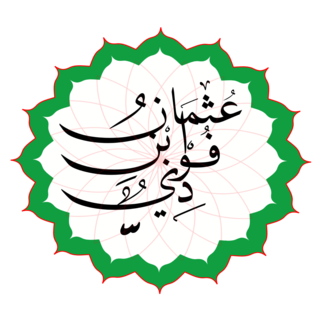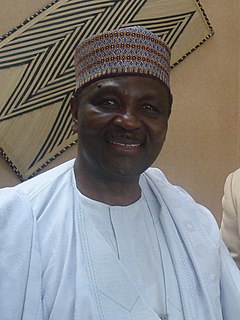Related Research Articles

Usman ɗan Fodio, was a Fulani scholar, religious teacher, revolutionary, military leader, writer, promoter of Sunni Islam, who founded the Sokoto Caliphate and ruled as its first caliph.

Sokoto is a major city located in the extreme northwest of Nigeria, near the confluence of the Sokoto River and the Rima River. As of 2006 it has a population of people over 427,760. Sokoto is the modern-day capital of Sokoto State and was previously the capital of the north-western states.

Shehu Usman Aliyu Shagari, titled Turakin Sokoto from 1962, was the first democratically elected President of Nigeria, after the transfer of power by military head of state General Olusegun Obasanjo in 1979 giving rise to the Second Nigerian Republic.

Yakubu Gowon, affectionately known as Jack Gowon, is a retired Nigerian Army general and military leader. As Head of State of Nigeria, Gowon presided over a controversial Nigerian Civil War and delivered the famous "no victor, no vanquished" speech at the war's end in an effort to promote healing and reconciliation. The Nigerian Civil War is listed as one of the deadliest in modern history, with some accusing Gowon of crimes against humanity and genocide. Gowon maintains that he committed no wrongdoing during the war and that his leadership saved the country.

Bauchi State is a state in the North-East geopolitical zone of Nigeria, bordered by Kano and Jigawa to the north, Taraba and Plateau to the south, Gombe and Yobe to the east, and Kaduna to the west. It takes its name from the historic town of Bauchi, which also serves as its capital city. The state was formed in 1976 when the former North-Eastern State was broken up. It originally included the area that is now Gombe State, which became a distinct state in 1996.

SokotoState is one of the 36 States of Nigeria, located in the extreme northwest of the country on the national border with the Republic of the Niger. Its capital and largest city is the city of Sokoto. Sokoto is located near to the confluence of the Sokoto River and the Rima River. As of 2005 it has an estimated population of more than 4.2 million.

Northern Nigeria was an autonomous division within Nigeria, distinctly different from the southern part of the country, with independent customs, foreign relations and security structures. In 1962 it acquired the territory of the British Northern Cameroons, which voted to become a province within Northern Nigeria.

North-Eastern State is a former administrative division of Nigeria. It was created on 27 May 1967 from parts of the Northern Region. Its capital was the city of Maiduguri. The North-Eastern is also full of agriculture and food.

East Central State is a former administrative division of Nigeria. It was created on 27 May 1967 from parts of the Eastern Region and existed until 3 February 1976, when it was divided into two states - Anambra and Imo. The area now comprises five states; Anambra, Imo, Enugu, Ebonyi and Abia. The city of Enugu was the capital of East Central State.
Lieutenant General Muhammad Gado Nasko was the military governor of Sokoto State, Nigeria between 1978–1979.

The Nigerian Army (NA) is the land force of the Nigerian Armed Forces. It is governed by the Nigerian Army Council (NAC). The Chief of Army Staff is the highest ranking military officer of the Nigerian Army.

Commissioner of Police (retired) Alhaji Usman Faruk was the first Military Governor of North-Western State in Nigeria from 1967 to 1975 after it was split off from the old Northern Region during the military regime of General Yakubu Gowon. He was dismissed from office by General Murtala Mohammed, who took power in a coup on 29 July 1975, and who then launched a probe that found him guilty of illegally enriching himself while in office. He was later reinstated by the Ibrahim Badamasi Babangida regime after being cleared of all charges, and was given his full benefits and retirement rank. Shortly after he left office the state was split into Niger State and Sokoto State.
Lt. Colonel Umaru Mohammed was appointed Governor of North-Western State in Nigeria in July 1975 at the start of the military regime of General Murtala Mohammed. In February 1976 North-Western State was split into Niger State and Sokoto State. Umaru Mohammed continued as Governor of Sokoto State until July 1978.
General Ahmed Muhammad Daku is a Nigerian general who was the military Governor of Kano State from August 1985 to December 1987. He later became military Governor of Sokoto State from December 1987 to August 1990.
Mohammed Arzika was appointed Nigerian Minister of Communications from June 1999 to June 2001 in the cabinet of President Olusegun Obasanjo. He died after a brief illness on 9 June 2015.
The 1st Division is a formation of the Nigerian Army. It was established during the Nigerian civil war and is charged with securing its area of responsibility covering the North Western flank of Nigeria and also ensuring that the borders located in its AOR are secured. The division is a mechanized infantry with affiliated combat support and combat service support units.
The Anglican Province of Kaduna is one of the 14 ecclesiastical provinces of the Church of Nigeria. The first archbishop was Josiah Idowu-Fearon, from 2002 to 2008. The current archbishop is Ali Buba Lamido, bishop of Wusasa, since 2017.
Abdu Gusau, Garkuwan Sokoto, MBE, OON (1918-1994), was a Nigerian civil engineer, and statesman who served as the Garkuwa of Sokoto until his death in 1994. He was the Chief estate engineer for Ahmadu Bello University, Zaria from 1967 to 1972 where he was in charge of estates, which included buildings, the campus road network and the water supply. Gusau also served as a principal engineer with Taylor Woodrow of London where he worked on building London Heathrow's airport terminal.
The 2019 Nigerian Senate election in Sokoto State was held on February 23, 2019, to elect members of the Nigerian Senate to represent Sokoto State. Aliyu Magatakarda Wamakko representing Sokoto North, Shehu Abubakar Tambuwal representing Sokoto South and Abdullahi Ibrahim Gobir representing Sokoto East all won on the platform of All Progressives Congress. But the Court of Appeal Sokoto Division on 30 October 2019 sacked Shehu Abubakar Tambuwal representing Sokoto South on the platform of All Progressives Congress. Ibrahim Abdullahi Danbaba on the platform of Peoples Democratic Party replaced the sacked senator.
References
- ↑ Pattke, Jens. "Enzyklopädie der staatlichen Wappen und Flaggen". crwflag. Bruce Berry. Retrieved 5 September 2020.
- ↑ Radwanski, S.A. (1969). Improvement of Red Acid Sands by the Neem Tree (Azadirachta Indica) in Sokoto, Northwestern State of Nigeria (Volume 6 ed.). Journal of Applied Ecology. Retrieved 6 September 2020.
- ↑ North-Western State (Nigeria) (1968). Introducing the North Western State of Nigeria. Sokoto: Dept. of Information, Office of the Secretary to the Military Governor. OCLC 662327.
- ↑ Salamone, Frank. A. (1973). "Gungawa wrestling as an ethnic boundary marker (Yauri division, North-Western State Nigeria)". Afrika und Übersee: Sprachen, Kulturen. 57 (3): 193–201. Retrieved 6 September 2020.